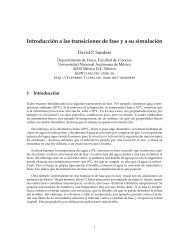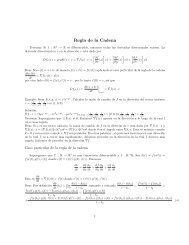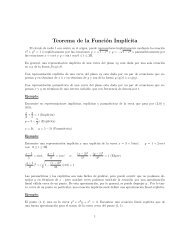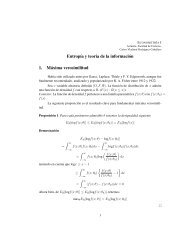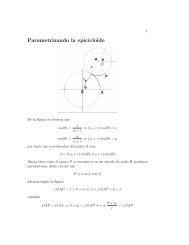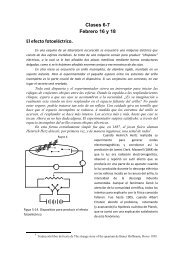"Surely You're Joking, Mr. Feynman!" - unam.
"Surely You're Joking, Mr. Feynman!" - unam.
"Surely You're Joking, Mr. Feynman!" - unam.
Create successful ePaper yourself
Turn your PDF publications into a flip-book with our unique Google optimized e-Paper software.
over, but they wouldn't do that either, because they would be losing face if they had to<br />
ask someone else. It was pitiful! All the work they did, intelligent people, but they got<br />
themselves into this funny state of mind, this strange kind of selfpropagating "education"<br />
which is meaningless, utterly meaningless!<br />
At the end of the academic year, the students asked me to give a talk about my<br />
experiences of teaching in Brazil. At the talk there would be not only students, but<br />
professors and government officials, so I made them promise that I could say whatever I<br />
wanted. They said, "Sure. Of course. It's a free country."<br />
So I came in, carrying the elementary physics textbook that they used in the first<br />
year of college. They thought this book was especially good because it had different<br />
kinds of typeface bold black for the most important things to remember, lighter for less<br />
important things, and so on.<br />
Right away somebody said, "<strong>You're</strong> not going to say anything bad about the<br />
textbook, are you? The man who wrote it is here, and everybody thinks it's a good<br />
textbook."<br />
"You promised I could say whatever I wanted."<br />
The lecture hall was full. I started out by defining science as an understanding of<br />
the behavior of nature. Then I asked, "What is a good reason for teaching science? Of<br />
course, no country can consider itself civilized unless. . . yak, yak, yak." They were all<br />
sitting there nodding, because I know that's the way they think.<br />
Then I say, "That, of course, is absurd, because why should we feel we have to<br />
keep up with another country? We have to do it for a good reason, a sensible reason; not<br />
just because other countries do." Then I talked about the utility of science, and its<br />
contribution to the improvement of the human condition, and all that I really teased<br />
them a little bit.<br />
Then I say, "The main purpose of my talk is to demonstrate to you that no science<br />
is being taught in Brazil!"<br />
I can see them stir, thinking, "What? No science? This is absolutely crazy! We<br />
have all these classes."<br />
So I tell them that one of the first things to strike me when I came to Brazil was to<br />
see elementary school kids in bookstores, buying physics books. There are so many kids<br />
learning physics in Brazil, beginning much earlier than kids do in the United States, that<br />
it's amazing you don't find many physicists in Brazil why is that? So many kids are<br />
working so hard, and nothing comes of it.<br />
Then I gave the analogy of a Greek scholar who loves the Greek language, who<br />
knows that in his own country there aren't many children studying Greek. But he comes<br />
to another country, where he is delighted to find everybody studying Greek even the<br />
smaller kids in the elementary schools. He goes to the examination of a student who is<br />
coming to get his degree in Greek, and asks him, "What were Socrates' ideas on the<br />
relationship between Truth and Beauty?" and the student can't answer. Then he asks the<br />
student, "What did Socrates say to Plato in the Third Symposium?" the student lights up<br />
and goes, "Brrrrrrrrrup" he tells you everything, word for word, that Socrates said, in<br />
beautiful Greek.<br />
But what Socrates was talking about in the Third Symposium was the relationship<br />
between Truth and Beauty!<br />
What this Greek scholar discovers is, the students in another country learn Greek



